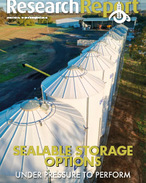This article is 3 years old. Images might not display.
The new variety, CBA Captain, is an erect desi type with early to mid-flowering, moderate lodging resistance and excellent harvestability.
Its release is part of the Chickpea Breeding Australia (CBA) initiative, a five-year, $30 million breeding program, launched in early 2020. The program is working to expand the geographic reach of chickpeas from their traditional northern New South Wales and Queensland region, into central and southern New South Wales and Western Australia.
CBA is a collaboration between the Grains Research and Development Corporation (GRDC) and the NSW Department of Primary Industries (DPI).
CBA program leader and NSW DPI chickpea breeder Kristy Hobson, said the team is engaging at every possible angle to improve yields, cold tolerance, disease resistance and adaptation to certain soils - constraints that have help chickpea production back.
Executive Officer of West Midlands Group, Nathan Craig, said CBA Captain is awesome when compared to PBA Striker, showing more vigour, is healthier and seems more adapted already.
"I am pretty confident that there is great future in WA with chickpeas and CBA Captain is part of that," Craig said.
Time of sowing trials have also shown how well chickpeas perform when planted a month earlier, in mid-April.
Last year, the West Midlands Group trials with varieties including PBA Striker saw yields double from one tonne per hectare to 2t/ha. The numbers on CBA Captain have not been crunched yet, however Craig expects that variety to perform just as well.
CBA has more than doubled trial plot numbers from 1416 to 3540 in the past two years, with yield trials underway across the Wheatbelt in WA.
Trials at Mingenew, Dalwallinu and Cunderdin will be include yield evaluations of a mix of stages one to three desi breeding lines. Run by Living Farms, more than 3300 plots were planted during 2020 and 2021. The Department of Primary Industries and Regional Development (DPIRD) has been responsible for 192 plots of stage three desi lines at Scaddan, north of Esperance.
Living Farm managing director, Richard Devlin, said the trials have been interesting, not only because of the new germplasm being tested, but also because of the geographical push.
"Pushing the variety more into the central and southern wheatbelt region could have great results. From what we see coming across the header deck, these lines are doing well in terms of yield and harvestability," Devlin said.
"This geographical push gives growers new legume options," he said.
"At the moment, chickpeas are double the price of lupins. That's a fair incentive to get it right. So, if we get the yield agronomics correct, such as harvestability and disease tolerance, there will be a high uptake in the southern region," Devlin said.
Australian Bureau of Agricultural and Resource Economics (ABARE) data indicates that 57,000ha of chickpeas were planted in the 2020-2021 growing season, compared to 8000ha in 2019-2020.
CBA is working to see the area of chickpeas planted in WA return to higher production levels again.
In WA, CBA has partnered with regional seed producers, Australian Seed and Grain (ASG) and Eastern Districts Seed Cleaning Co (EDSCO), to distribute the CBA Captain chickpea variety.
For more information, visit https://groundcover.grdc.com.au























